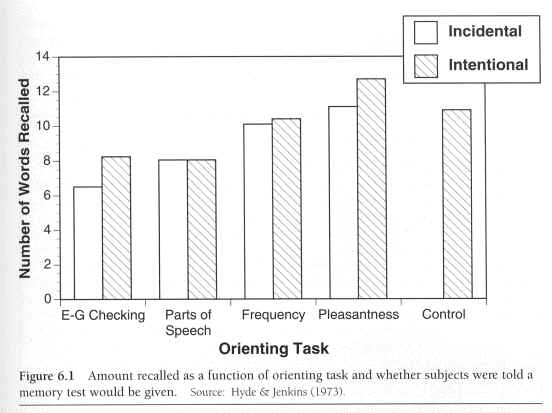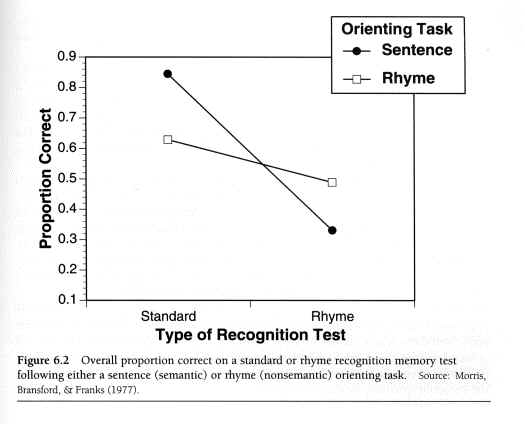
Psy
342 Learning & Memory
Perspectives
on Processing (Ch. 9)
I. Levels of ProcessingóCraik & Lockhart (1972) suggested that processing was more important than the underlying structure of memory
Instructions
A Instructions
B List
A.
Four assumptions:
(1)
Memory is result of a series of analyses performed on the to-be-processed
information.
Shallow
level vs. deep level
(2)
The deeper the level, the more durable the resulting memory.
Focusing on the meaning of the to-be-remembered item should lead to a stronger memory, rather than focusing on how the item sounds.
(3)
Rehearsal will be beneficial only to the extent that it induces a deeper level
processing.
Elaborative vs. maintenance rehearsal
(4)
Experimenter should control type of processing.
Incidental
vs Intentional learning
B.
Deep processing aids recall because of two factors
1.
Distinctivenessóways that a stimulus is different from all other memory
traces
However,
organization in terms of similarities is also important in helping to improve
memory.
Ss
recall more words from a categorized list than from an uncategorized list.
**How
can both distinctiveness and similarity be beneficial to memory?
2. Elaborationóoperates with deep levels of processing and requires rich processing in terms of meaning. We rarely think about an item in isolation. This relational processing (how the item fits with other items in memory) is helpful because it emphasizes organization.
C.
Levels of Processing and Memory for
Verbal Material
Hyde
& Jenkins (1973)
To-be-remembered
items were 24 common words presented auditorily. Free recall task
Groups
differed in orienting instructions and whether they were told of the free recall
test.
Shallow
Slightly
deeper
Deeper
Deepest
Intentional
groupótold about later test
Incidental
groupónot told about test
Control
group--told to remember the words for a later free recall test (level of
processing was free to vary)

D.
Levels of Processing and Memory for Faces
Shallow
processing of facesólike shallow processing of wordsóleads to poor recall.
How
can we explain why depth of processing facilitates memory
for faces?
E.
Problems with levels of processing
(1)
Circular assumption
(2)
All encoding, very little about retrieval
II. Transfer Appropriate
Processing
A.
Definition--A particular type of processing leads to better performance
because it is appropriate given the kind of test that will be conducted.
In
general, deep processing leads to better performance than
shallow processing for free recall tests
What
about other types of tests?
Is deeper processing always better?
B.
Morris, Bransford, and Franks (1977)
Does deeper processing ALWAYS lead to better memory performance or does
performance DEPEND on the method used to test memory?
Perhaps retention depends on the level of processing (at encoding) and the type of information requested on the test (at retrieval).
Auditorily
presented 32 sentences
Ss
judged whether a target word filled in the blank (The ___ had a silver engine).
TRAIN yes or
no? OR
Ss
judged whether the target word rhymed with another (___ rhymes with legal).
Two
levels of incidental learning
Two
types of testsórecognition and rhyming recognition

Recognition
test-- deeper task led to better performance
Rhyme
recognition-- shallow task led to better performance
Interpreted
their results as supporting transfer appropriate processing.
Conclusion--a
type of processing will lead to better memory performance if it is appropriate
for the particular test; no one type of processing is good for all tests.